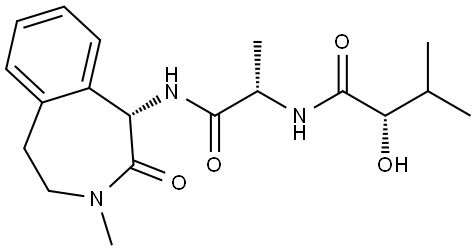Uses
Semagacestat is an inhibitor of the γ-secretase enzyme. γ-Secretase enzyme is pivotal in the generation of β-amyloid (Aβ), a neurotoxic endogenous peptide believed to be involved in the pathogenesis of Alzheimer''s disease (AD).
Biological Activity
semagacestat (also known as ly450139), [(2s)-2-hydroxy-n-((2s)-1-((1s)-3-methyl-2-oxo-2,3,4,5-tetrahydro-1h-benzo[d]azepin-1ylamino)-1-oxopropan-2-yl)-3-methylbutanamide] is an azepine class γ-secretase, which is currently being investigated as a potential disease-modifying agent for the treatment of alzheimer’s disease (ad). it reduces the rate of formation of amyloid-β (aβ), a major component of the neuritic plaque in the brains of ad patients, in human subjects and animal models including mice, beagle dogs and guinea pigs. according to previous studies, semagacestat slows the accumulation of aβ in the brains of transgenic mice overexpressing mutant human amyloid precursor protein v717f (pdapp mice) and exhibits a dose-dependent decrease of plasma in ad patients.ping yi, chad hadden, palaniappan kulanthaivel, nathan calvert, william annes, thomas brown, robert j. barbuch, archana chaudhary, mosun a. ayan-oshodi, and barbara j. ring. disposition and metabolism of semagacestat, a γ-secretase inhibitor, in humans. drug metabolism and disposition 2010; 38(4): 554-565



